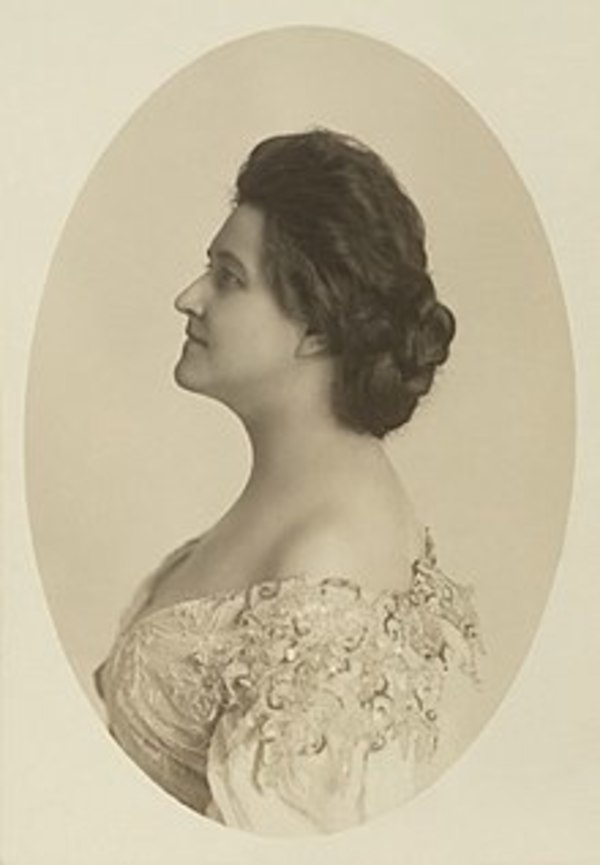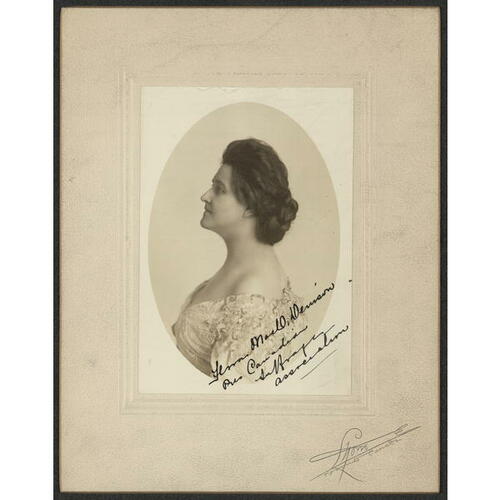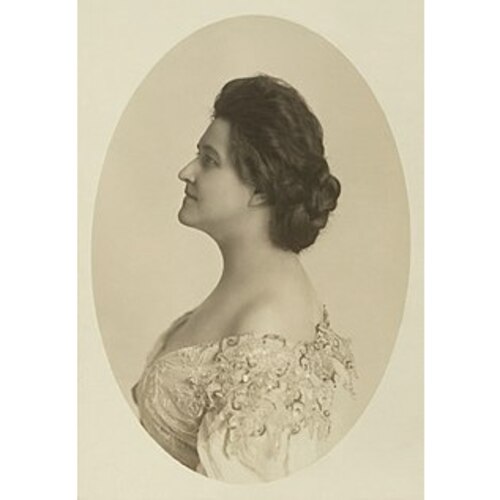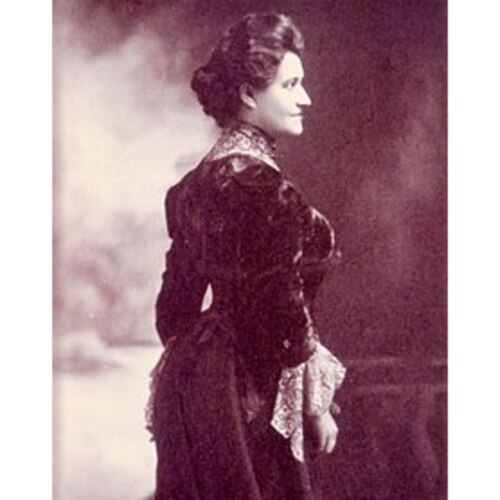
Source: Courtesy of Wikimedia Commons
MERRILL, FLORA MacDONALD (Denison), dressmaker, writer, innkeeper, social reformer, feminist, and spiritualist; b. 20 Feb. 1867 near Bridgewater (Actinolite), Upper Canada, daughter of George A. Merrill and Elizabeth MacTavish Thompson; m. 12 Aug. 1892 Howard Denison in Detroit, and they had one son, Merrill*; d. 23 May 1921 in Toronto.
Flora MacDonald Merrill Denison lived two lives, one conventional, the other not. As Flora MacDonald (a frequent nom de plume and her maternal grandmother’s name), she once wrote, “I have been an interested tenant of Mrs. Denison’s body and at times we differ so vastly in our reasoning and conclusions that I have come to believe she and I are two different personalities.” Mrs Denison, apparently, was “someone outside myself.” This firmly held, and practised, mystical belief complicates any attempt to reconstruct her lives, material and spiritual, especially the early, Merrill years.
Flora’s Merrill ancestry included politically respectable loyalists and religiously unorthodox universalists. Her father alternated between universalism and spiritualism; her schoolteacher mother sometimes declared herself a Catholic, sometimes a Methodist. George Merrill, a successful but discontented schoolmaster, tried his hand at prospecting and mining, in association with Billa Flint*, in the wilds of Hastings County, where Flora was born. The venture proved financially disastrous. The family then settled in Belleville, where Merrill probably continued to dream of a mining bonanza, but never gained regular employment. His daughter depicted him as a village intellectual and spiritualist engaging in controversies over religion and science and attempting to create perpetual motion. Alcohol may have been a problem. Elizabeth apparently supported the family. The sixth of eight children, Flora attended school in Belleville and then Picton, dropping out at the age of 15. After a brief stint at schoolteaching that she later described as “little more enticing to me than solitary confinement,” she may have attended business school in Belleville, perhaps taught again briefly, worked in Montreal, and then moved to Toronto, employed for a short period at an insurance agency.
The death of her eldest sister, Mary Edwards Merrill, in 1880 was traumatic. Flora would later report that during a period of depression in the mid 1880s her life was transformed by a psychic experience during which her sister materialized and restored her confidence in the future. In 1900 she told Mary’s life story in Mary Melville, the psychic. Beyond the descriptions of Mary’s astonishing psychic powers and advanced mathematical and linguistic genius, the book reveals much about the religious unorthodoxy that Flora had experienced in her early years, leading to her rejection of traditional Christianity, especially the doctrine of total depravity. The evangelists Dwight Lyman Moody and Ira David Sankey make an appearance as does the popular American freethinker Colonel Robert Green Ingersoll, a friend of Walt Whitman who introduced Flora to the poet’s work when she heard him speak in 1892. (She may, in fact, have been exposed to Ingersoll earlier, for he had lectured in Belleville in 1880.) The authenticity of the Bible, the validity of such theological doctrines as eternal punishment and the transcendence of God, as well as the meaning of Darwinism are all debated. Mary, her father, and, of course, the author favoured a religion that combined a gospel of social criticism with spiritualism. After Mary’s death one of the attending physicians observed, “She did more to make me believe in an existence outside of the body, than did all the sermons I ever listened to. . . . She so often said to me, ‘. . . poverty should be for none while there is prosperity for any. Caste is the heaviest curse civilization has to carry.’” The Reverend Benjamin Fish Austin*, a prominent Methodist divine recently expelled from his denomination for defending the reality of psychic phenomena, published Mary Melville. (Austin had attended Albert College in Belleville with Mary and had shared the platform with Flora at Lily Dale, the spiritualist summer camp in New York State.) He declared the book “in all essential features . . . a genuine biography of a real and wonderful life.” Whatever the fictional element of Mary Melville (both spiritualists and rationalists performed in 19th-century Belleville and most of the details of Mary Melville’s life have been confirmed), the religious and social ideas expressed in the book were ones that guided Flora throughout her career.
Sometime in the mid 1880s Flora moved to Detroit, where she had relatives. There she probably found office work and may also have begun to write. In August 1892 she entered into a form of marriage with Howard Denison, an already married travelling garment salesman. She called him her husband and the union may have been legalized after the death of Howard’s wife in 1904. His role in her life is not clear; the relationship would end in 1914. On 23 June 1893, after the Denisons had moved to Toronto, Merrill was born in Detroit, where Flora had gone for the delivery to ensure for her son the personal and political freedom she associated with the United States. Merrill would become her greatest source of comfort, her intellectual companion and lifelong friend. Since she was a pacifist, it grieved her greatly when he joined the United States Army Ambulance Corps in 1916 but his service in France cemented what Merrill called “the sacred order of the Mother and Son.”
Her unconventional marriage and growing attraction to the sexual freedom and democratic ideals found in Whitman’s poetry informed an unpublished novel (written with Edmund Ernest Sheppard’s daughter Hazel Sheppard Wagner) entitled “Flora MacDam’s karma or outside of Eden” (1905). It condemned marriage as “another old superstition invented by the church as a source of revenue and also to keep people in subjection to its dogmas,” defended free love, and asserted: “Illegitimate! . . . Not a child born under all of nature’s wisest regulations, the mutual desire for sexual embrace, should be branded with the blackest word in our vocabulary.” Few, even feminist, Canadians shared this radical view of marriage during Denison’s lifetime.
In Toronto, Flora entered the dressmaking trade. For the remainder of her life she would be gainfully employed, sometimes in more than one occupation, supporting herself, her child, and perhaps even her husband. In this respect, she practised what she would frequently preach: women’s need for financial independence as the basis of genuine equality. In August 1898 she became manager of the custom-dress department of the Robert Simpson Company, a position that required her to design and sew “the swell dresses worn at the Yacht Club ball.” Similar costumes would later motivate her demand for “saner dress for women.” Her work doubtless also allowed her an opportunity to observe the oppressed condition of the mainly women workers employed in the garment industry. That subject she would soon take up in her contributions to Saturday Night, where she criticized the “competitive system . . . [in which] hundreds go under that a few may be on top,” and in 1910 she would support the strike by women workers at the T. E. Braime and Company clothing factory in Toronto. In 1905 she left Simpson’s to start her own dressmaking business, Denison Costumer, whose success allowed her to support financially the growing women’s movement, in which she took an increasingly active role.
Though Mary Melville was not explicitly a feminist novel, it did star a young woman who had “knowledge of a higher plane.” Perhaps Flora had already begun to read feminist books that she would later refer to – Charlotte Perkins Gilman’s Women and economics . . . (Boston, 1898) and The home . . . (New York, 1903), and Olive Schreiner’s Women and labor (New York, [1911]). She was also familiar with critiques of traditional marriage and the family by Edward Carpenter and H. G. Wells. Then there were the contacts she made with leaders of the women’s movement in Toronto, especially Dr Emily Howard Stowe [Jennings*], her daughter Dr Ann Augusta Stowe* Gullen, and Dr Margaret Blair Gordon, founders of the campaign for woman suffrage. In 1906 she became secretary of the Dominion Women’s Enfranchisement Association, which was soon renamed the Canadian Suffrage Association. For a time her home on Carlton Street would serve as headquarters for the CSA, of which she was president from 1911 to 1914. She attended two of the annual world conventions of the International Woman Suffrage Alliance, in Copenhagen in 1906 and Budapest in 1913. She knew and greatly admired Emmeline Pankhurst, the British suffragist leader, who stayed with her during her Canadian tours in 1909 and 1911. In 1913, while visiting the United Kingdom, Denison joined the Women’s Social and Political Union and participated in the protest meeting at the London Pavilion where Pankhurst was arrested. Carrie Chapman Catt, president of the National American Woman Suffrage Association, would hire Flora as a full-time paid lecturer in the successful campaign for the franchise in New York State in 1917.
In 1906 Denison gained a popular platform for her feminist advocacy when she began writing a column in the Toronto World, run by William Findlay Maclean. It appeared first as “Under the Pines,” then as “The Open Road towards Democracy,” and finally after 1913 as “Stray Leaves from a Suffragette’s Notebook.” The rights of women evoked her strongest passion. She summed up her claim to equality this way: “A woman’s duty and a woman’s sphere is just where her capabilities and opportunities lead her.” The achievement of equality would make women partners, not opponents of men. “Men need women in politics; women need men in the home,” she argued.
The economic and political equality that Denison demanded as a right revealed a feminism that contrasted with the view of the more numerous maternal feminists, who advocated equal suffrage mainly as a defence of the home and family values threatened by industrial and urban society. Denison, as president of the CSA, sat as an ex officio member of the executive of the National Council of Women of Canada, a body that she repeatedly criticized for its temporizing moderation. In 1912 she broke openly with the council over the issue of flogging as a punishment for “procurers.” For her, prostitution was a socio-economic issue rather than a moral one. It was not by physical punishment but through social reform that “white slavery” would be abolished. Her stand on this and other issues – her criticism of the tyranny of the home, her support of divorce and birth control, and especially her reluctant defence of the militant tactics of the Women’s Social and Political Union – first split the CSA, when the moderates formed the Equal Franchise League in 1912, and then forced Denison’s resignation in 1914. But she continued to campaign. In 1917 she celebrated recent suffragist victories and endorsed Charlotte Perkins Gilman’s optimistic assertion that “the immediate hope of the world is in women.”
Denison’s reform activities were never confined to the suffragist cause. She sympathized with working women and worried about their neglected children, suggesting that women should be paid to stay home. She advocated state intervention to construct “a great hospital home, guaranteeing employment and comfort to all within its gates.” “Caste” was “the greatest curse in this world . . . the greatest blessing its abolition,” she wrote in 1907, “and when I use the word ‘caste’ I do so advisedly, because it is comprehensive and far-reaching enough to include the thousand and one evils of state, of church and of social conditions generally.” She supported the Canadian Rational Sunday League’s campaign in favour of Sunday streetcars and against a ban on Sunday tobogganing. She joined the Progressive Thought Club, to discuss “new thought, scientific and psychical lines.” “All theories for social betterment were expounded,” she noted, “and advocates of single tax, socialism, spiritualism, theosophy, Christianity, could be heard any Saturday night at Forum Hall.” The alternative medical practices of her feminist physician friends, ranging from the laying on of hands to hydrotherapy and electric currents, won her approval. When war broke out in August 1914 she called upon women to oppose it, arguing that “had women stood shoulder to shoulder with men in thinking out world problems this war would never have been.” Later in the conflict she supported the campaign for the prohibition of alcohol [see Francis Stephens Spence*].
Denison spent the early years of the war in Napanee, working as a dressmaker to pay for her son’s education and recoup her finances. But by 1916 the central focus of her life became the Bon Echo Inn at Mazinaw (Massanoga) Lake, which she and her husband had purchased in 1910. “My life’s work from now on,” she wrote, “will be in propagating the Ideals of Whitman with Bon Echo as a glorious vantage ground.” This rustic inn, originally built by a Cleveland dental surgeon as a wilderness retreat from industrial cities, would serve two purposes. Its rental rooms and cabins (one named in honour of Charlotte Perkins Gilman after a 1911 visit) would provide income. More important, Bon Echo would become a memorial to “the great grey poet,” the centre of the Whitman Fellowship of Canada, and an “Institution of the Dear Love of Comrades,” a phrase that describes the rather vague, democratic, communal, spiritual philosophy that Flora and others drew from the American poet. “Walt Whitman has been the great positive spiritualizing force,” the Whitmanites believed, “absolutely refuting the conclusions of materialistic science by including all their findings and infusing them with the divine fire of an immortal soul.”
In March 1916 Denison began publishing the Sunset of Bon Echo (a total of six issues appeared by May 1920). The magazine combined promotion of the commercial and the Whitmanite goals of the wilderness resort where she employed native people and sometimes dressed in her own version of native costume. “Sunset,” she explained, “. . . was an Indian Chief. He first became my friend when Mrs. Denison – then Flora Merrill – taught school in the backwoods.” The chief practised “both mental and magnetic healing.” Among the visitors to Bon Echo were single-tax cartoonist John Wilson Bengough, Albert Ernest Stafford Smythe*, founder of the Toronto Theosophical Society, Frederic Marlett Bell-Smith, painter, and James Laughlin Hughes*, educational reformer.
The annual gatherings culminated in the August 1919 celebration of the centennial of Whitman’s birth, featuring the dedication of the great rock – “Canada’s Gibraltar” – that looms over Mazinaw to “OLD WALT, 1819–1919: dedicated to the democratic ideals of Walt Whitman by Horace Traubel and Flora MacDonald.” The ageing, ailing Traubel, a biographer and long-time associate of Whitman, travelled from New York for the occasion. He expired two weeks later, the spirit of Old Walt at his deathbed. Flora minutely recorded the struggle to transport Traubel’s body south to the railway at Kaladar (Merrill Denison acting as undertaker) and then on to New York for embalming, followed by the funeral there, during which the church caught fire, and burial in Camden, N.J. (Whitman’s final resting place).
After the Great War ended, Denison continued the spiritualist and reformist role she had crafted for herself during the first two decades of the century. Her letters to her son often recounted communications with Mary and Old Walt, and her participation in the Association for Psychical Research of Canada. In February 1919 she attended a phenomenal three-hour seance at the Toronto home of Dr Albert Durrant Watson, author of The twentieth plane . . . (Toronto, 1918), where the psychic Louis Benjamin presided. She recorded that “I have sat in hundreds of circles, often with the most remarkable Psychics that any age has produced, but I never sat in one where the dominant note of Love was so pronounced.” Lincoln, Ingersoll, Emerson, William Cullen Bryant, and Dr Richard Maurice Bucke* were summoned to attest to Walt Whitman’s genius.
So, too, she attended meetings of the Theosophical Society to hear George Herbert Locke*, the chief of the Toronto Public Library, and the People’s Forum to hear Robert Henry Halbert, the president of the United Farmers of Ontario. She was a founder of and campaigner for the Ontario section of the Canadian Labor Party. Despite her pessimism about the fate of reform movements in the post-war world, she intended to continue contributing her considerable platform talents to the cause. Though far from an original thinker, she combined practical reform with a mystical utopian vision of “a higher conception of human nature and the brotherhood of man” that was characteristic of many late-Victorian English Canadian regenerators.
Still not restored to full health after a bout with Spanish influenza in autumn 1919, Flora visited Bon Echo during the unseasonably cold, wet spring of 1921. She contracted pneumonia and died on 23 May. Like her feminist mentor, Dr Emily Howard Stowe (“I see no other woman to approach her yet”), she was cremated in Buffalo, doubtless as a demonstration of the superiority of the spiritual over the material life, and the triumph of Flora MacDonald over Mrs Denison.
Flora MacDonald [Merrill] (Denison)’s Mary Melville, the psychic was published in Toronto in 1900.
QUA, Merrill Denison fonds. Univ. of Toronto Library, Thomas Fisher Rare Book Library, ms coll. 51 (Flora MacDonald Denison papers). World (Toronto), 1906–13. C. L. Bacchi, Liberation deferred? The ideas of the English-Canadian suffragists, 1877–1918 (Toronto, 1983). Ann Braude, Radical spirits: spiritualism and women’s rights in nineteenth-century America (Boston, 1989). Ramsay Cook, The regenerators: social criticism in late Victorian English Canada (Toronto, 1985). Deborah Gorham, “Flora MacDonald Denison: Canadian feminist,” in A not unreasonable claim: women and reform in Canada, 1880s–1920s, ed. Linda Kealey (Toronto, 1979), 47–70. Michèle Lacombe, “Songs of the open road: Bon Echo, urban utopians and the cult of nature,” Journal of Canadian Studies (Peterborough, Ont.), 33 (1998–99), no.2: 152–67; “Theosophy and the Canadian idealist tradition: a preliminary exploration,” Journal of Canadian Studies, 17 (1982–83), no.2: 100–18. Alex Owen, The darkened room: women, power, and spiritualism in late nineteenth century England (London, 1989). Robert Stacey and Stan McMullin, Massanoga: the art of Bon Echo (n.p., 1998). Sunset of Bon Echo (Toronto), 1 (March 1916–April/May 1920), nos.1–6.
Cite This Article
Ramsay Cook and Michèle Lacombe, “MERRILL, FLORA MacDONALD (Denison),” in Dictionary of Canadian Biography, vol. 15, University of Toronto/Université Laval, 2003–, accessed April 2, 2025, https://www.biographi.ca/en/bio/merrill_flora_macdonald_15E.html.
The citation above shows the format for footnotes and endnotes according to the Chicago manual of style (16th edition). Information to be used in other citation formats:
| Permalink: | https://www.biographi.ca/en/bio/merrill_flora_macdonald_15E.html |
| Author of Article: | Ramsay Cook and Michèle Lacombe |
| Title of Article: | MERRILL, FLORA MacDONALD (Denison) |
| Publication Name: | Dictionary of Canadian Biography, vol. 15 |
| Publisher: | University of Toronto/Université Laval |
| Year of revision: | 2005 |
| Access Date: | April 2, 2025 |





